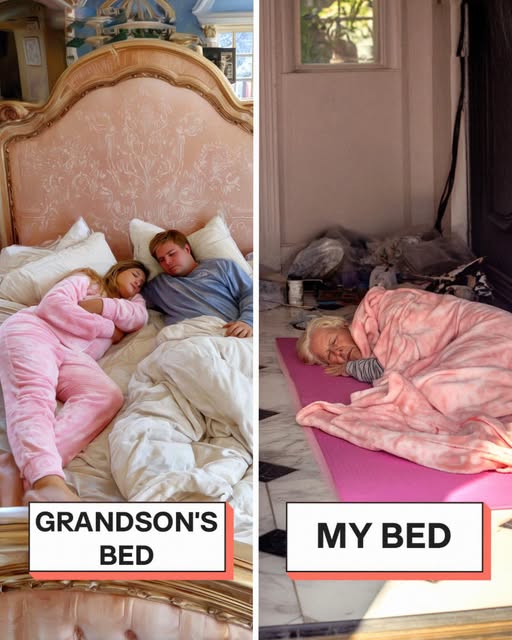I raised my grandson from the day he was born, gave him everything I had, and loved him like my own son. So when he invited me on a weekend trip, I thought it was his way of showing gratitude. I never imagined I’d end up sleeping on the floor—while karma prepared the lesson of his lifetime.
At 87, I thought I had seen it all. Wars, loss, heartbreak, even two strokes that left half my face numb. But nothing prepared me for being betrayed by the boy I’d raised as my own.
I took care of my grandson, Tyler, from the moment he came into this world. His mother, my sweet Marianne, died giving birth to him. His father, Daniel, couldn’t handle the grief and vanished. Last I heard, he was living somewhere in Nevada in a trailer park.
So it was me who fed Tyler his bottles at two in the morning, rocked him to sleep when he cried, and walked him to kindergarten with a backpack bigger than him. I gave him everything I could, even when all I had was barely enough.
But the boy I raised with so much love grew into a man I hardly recognized.
Tyler is 32 now and still lives under my roof—not out of care, but convenience.
“Why waste money on rent when you have this big house, Grandma?” he’d say, like he was doing me a favor.
Worse yet, he’d reinvented himself into a “spiritual” man—chanting at sunrise, filling my living room with incense, yoga mats, and endless talk of chakras and “vibrations.” To strangers, he seemed enlightened. But to me, it was all an act—a cover for his laziness, his freeloading, and those shady friends whispering about “investments.”
So when he invited me three weeks ago on a “weekend getaway,” I was shocked.
“Grandma, Willow and I are going to Charleston. We want you to come,” he said.
Willow was his new girlfriend—a thin young woman with crystal earrings and a constant humming tone, like she lived in her own little world.
“Why would you want me to come?” I asked, cautious.
“Because I love you, Grandma,” he said with that same charming smile he had as a boy. “And it’ll be cheaper if we split the costs.”
There it was—cheaper. But I wanted to believe him. I wanted to feel close to him again. So I said yes.
When we arrived in Charleston, instead of a nice hotel, he pulled up to a run-down apartment in a rough neighborhood.
“It’s my spiritual brother’s place,” he said. “Way better than wasting money on hotels.”
Inside, there were two bedrooms. Tyler and Willow immediately claimed one. In the corner, I saw a small single bed by the window. “Oh good, I can take that one,” I said, relieved.
Tyler’s face hardened. “Uh, no, Grandma. We need our energy protected when we sleep.”
Instead, he handed me a thin yoga mat and unrolled it on the hardwood floor in the hallway.
“Sleeping on the floor is great for your spine,” he said. “It’s grounding.”
I said nothing. My back ached just looking at that mat. But I didn’t argue.
That night, I lay awake on the hard floor, listening to their laughter from the next room. By morning, my body screamed in pain, but Tyler only yawned and said, “Come on, Grandma, my treat for brunch.”
But fate had other plans.
At a gas station stop, two men in dark suits approached him. “Tyler?”
“Yeah?” he said casually.
“You’re under arrest for wire fraud and identity theft.”
Right there, they cuffed him. The coffee cups fell from his hands, spilling across the concrete.
I was in shock. “There must be some mistake!” I cried.
But there wasn’t. They explained he’d been running scams—fake retreats, fake investments—using my name, my credit, and my social security. My own grandson had been stealing from me.
Willow didn’t say a word. She grabbed her bag and vanished into a rideshare, gone like smoke.
At the police station, I spent hours sorting out the mess. Accounts I never opened, purchases I never made. And when they finally let me see Tyler, he was in an orange jumpsuit, smirking behind a plexiglass window.
“Grandma,” he said, “just tell them you gave me permission to use your name. You owe me this.”
“Owe you?” I repeated, my voice trembling.
“Yes! I let you live in your house rent-free! I didn’t throw you into a nursing home.”
I stared at him. “You let me? That’s my house, Tyler. The one I worked forty years to pay for. You made me sleep on a yoga mat while you lied and stole using my name.”
For once, he had no answer.
“I don’t owe you a thing,” I said, standing tall despite my shaking legs. “Not anymore.”
When I left the station, an officer approached me. “Excuse me, ma’am—are you Eleanor? You used to run the bakery on Main Street?”
I nodded.
He smiled warmly. “I’m Officer Daniels. You used to give me free cookies when my mom couldn’t afford them. I never forgot your kindness.”
Tears filled my eyes.
“Don’t worry, ma’am,” he said gently. “I’ll drive you home.”
And he did. He fixed my broken door lock before leaving and gave me his card, just in case.
That night, I sat in my armchair thinking about everything. Tyler had turned his back on kindness and family—and lost everything.
But I realized something important: kindness never disappears. It waits—sometimes for years—and comes back to you when you need it most.
